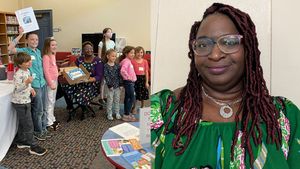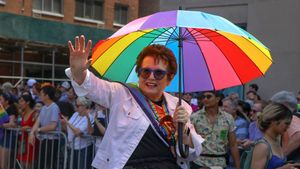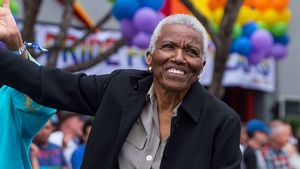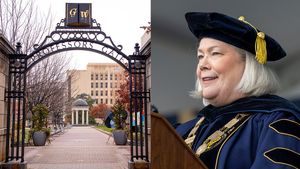In 2013, prior to her Pose fame, Angelica Ross was working as an employment coordinator for Chicago House’s TransLife Care Program, which provides health care and social services to transgender, nonbinary, and gender-expansive people. At the time, Ross saw the nonprofit’s goals for the trans community as limited, so she proposed development plans for job seekers in the tech industry. She was met with a cold shoulder.
“I thought the nonprofit was taking trans people for granted,” Ross says. “It was using them for metrics and funding points but not believing in other possibilities for my community.” In response, she was told that tech would “go over people’s heads.”
While she has a “great relationship” with Chicago House now, Ross recalls feeling “undermined” by her supervisors 10 years ago. In response, Ross quit that job and in 2014 created a new organization, TransTech Social Enterprises, which seeks to empower, educate, and employ LGBTQ+ people through technology.
Ross has always been a self-starter. Born at St. Catherine’s Hospital in Kenosha, Wis., she describes “growing up in what we’d call the hood. And yes, there’s a hood in Wisconsin.” Both of her parents were employed: Her mother is a teacher and her stepfather runs a manufacturing company, where he worked for over 35 years while earning a GED and putting himself through college. Ross credits her mother for prioritizing education, and she references her dad — who calls her “my little CEO” — as someone who led by example. “Every little venture, we get on the phone and talk business for hours,” she attests.
As the world now knows, business wasn’t Ross’s only calling. As a child, she starred in theater productions of Snow White and the Seven Dwarfs, Anything Goes, and Willy Wonka & the Chocolate Factory, to name a few. “If you talk about Malcolm Gladwell’s Outliers and having 10,000 hours doing things…before I even graduated high school, I was doing movement, I was sight-reading music, I was singing in chorale in Italian, I was in the jazz choir, I was in the church choir, I was in the school plays, I was also in the community theater. It was projected that I would be a star. I felt it. I knew it.”
After graduating high school, Ross slept on the streets of Chicago for 24 hours to audition for MTV’s Wanna Be a VJ. But during that audition, she realized that she struggled to read a teleprompter. Ross still wanted to become an actress and live in New York City, but Henrietta, N.Y. — a town near Rochester — is the closest she could get to the Big Apple at the time. “It was very naive of me to think that I would be driving six hours each way for auditions,” she says.
As Ross struggled to break into showbiz, she decided to “try my dad’s way” and pursue a business career instead. So in 1998, she enlisted in the U.S. Navy, hoping that her college tuition could be paid for. This was four years after President Bill Clinton had instituted “don’t ask, don’t tell,” but Ross didn’t believe that the policy would actually be enforced. It was a compromise intended to be better than the previous outright ban on queer service members, but it wasn’t.
“There’s two parts: Don’t ask, and don’t tell. But I was being asked,” she recalls. “They kept asking while I was in the military, and I kept trying to deny it. One day, they [several enlisted men] cornered me into a three-story hotel room while our ship was being worked on. We were about to go to Hong Kong, which would be my first journey, but I kept getting threats. They’d tell me all these stories of people who’d get lost overboard while they were out to sea and the lights went out. One thing I learned in life is that you don’t have to tell me twice. Once I heard that, I went to the captain’s office, and I was like, ‘I think it’s time for me to hit it.’”
“I did some research. There was a clause that if you could not adapt to military life within 180 days, you could get out,” Ross adds. “I thought that I’d be able to get out that way, but [the captain] said no, that I’d also have to admit that I was gay on paper. That ‘don’t ask, don’t tell’ situation, I don’t know what that was about; I definitely had to tell it on paper.”
Ross was discharged from the military after six months of service. In the following years, she held a number of odd jobs — one of them being a web manager, which helped her make ends meet and take acting classes. Self-taught in coding, graphic design, and photo editing, Ross now hopes to pass those skills on through TransTech.
While building a Hollywood career and before her breakthrough 2018 Pose role as Candy Ferocity, Ross was conducting Skype workshops with Laverne Cox, Geena Rocero, and other trans luminaries who could “inspire folks dealing with homelessness” so they could “see other trans people doing amazing things.” Janet Mock even visited the office to sign copies of her book Redefining Realness. However, running an organization like TransTech came with new challenges.
“When trying to fundraise money for TransTech, I started to realize that if I didn’t do things a certain way, I wasn’t getting any funding or support,” she explains. “Since founding TransTech, I haven’t taken a salary. The first time that the executive director got paid was when I hired E.C. Pizarro III [for the role]. He’s been making a salary for the past three or four years.” In those early days, Ross remembers that she would “sleep at the office and shower at a Planet Fitness gym.”
Even breaks came with drawbacks. While fundraising for TransTech, Ross was booked in 2015 for a speaking engagement at the White House. Ross credits the event with “amplifying the profile” of the organization while highlighting that TransTech received more “visibility but no funding.” She sums up the experience as “visibility that magnifies and burns you up in it.”
TransTech is celebrating its 10-year anniversary this year, and the organization is, thankfully, more solidified now. “The turning point for things was bringing E.C. Pizarro III on as our executive director, and the continued relationships we made with folks like Google,” Ross says. “We have our Grow With Google program that helps our members get Google certifications, which are valuable for getting jobs. That program started with me in 2020 when the pandemic hit, and I wasn’t filming. I started doing free Zoom webinars with our TransTech members and would talk about goal-setting with the GROW model [Goal, Reality, Obstacles, Way Forward]. That eventually turned into a program that was powered by Google.”
Google wasn’t the only breakthrough. “We also have a relationship with the Linux Foundation that gives our members certifications,” she continues. “We had a partnership with MasterClass that gave our memberships free access to masterclass.com. Giving access to our members is the thing that I’ve been most proud of. That’s the biggest thing that we’ve been lacking: access.”
Besides her work on TransTech, Ross is launching a political career, a “leaving Hollywood” move she first announced to The Hollywood Reporter after alleging she was mistreated by Ryan Murphy and Emma Roberts on the set of American Horror Story. “Yeah, I’m actually in Georgia right now, and I’m preparing to run for office,” she says. Ross is keeping busy; she also teases a recently launched online community called the Winner Circle that she’s running and an upcoming book that she’s already written. And though she’s physically left the entertainment capital, Ross hasn’t abandoned the biz. Expect a few exciting acting projects to debut in the coming months.
Ross tells the story of her life with clarity, candor, and confidence — and she’s just as direct when making a request during this interview. “I don’t ask for anything, but I do want to ask you that it is made clear that I’ve lived my life in a way that…I wouldn’t recommend, [such as] the sacrifices and things that I have personally done to build TransTech. What I did was to believe that the little bit of privilege I had in my possibility, in my beauty, in my intelligence, in my education, I thought that I had that to wager. I bet on myself, and I think I won, but it came at an extreme cost to myself.”
“Even when you see things get taken away from me, and when it looks like, ‘Oh, she’s being blacklisted.’ I know that my value is independent of these circumstances,” she says, adding, “Even if [someone] doesn’t value my contributions, I know what was built on my back. I know that the blessings that I receive now are mine, and I receive them. Because I have given, and I am now in a place to receive my flowers while I’m living.”
Learn more about TransTech Social Enterprises and how to support its work at transtechsocial.org.
This feature is part of Out's September/October issue, which hits newsstands on August 28. Support queer media and subscribe — or download the issue through Apple News, Zinio, Nook, or PressReader starting August 13.







































































